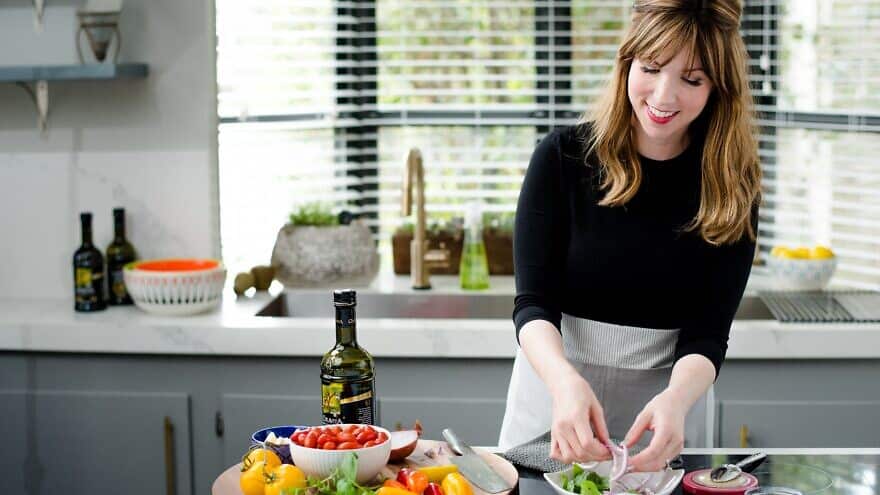
When Helena Baker launched the Jewish Women’s Global Network last October, she had no idea how her networking-based program would transform in the wake of the imminent coronavirus. And she certainly had no idea how the inspirational, business-focused approach would hit home for those left at home, many recently unemployed.
Baker, 27, started the network a year after making aliyah from England, hoping that a networking group for women might aid her own efforts to find work as a freelance writer. Reaching out to Jewish, female influencers and CEOs in Israel, she brought what she calls some “pretty big names” to Tel Aviv every two weeks to share their passions and best practices in business for an audience of between 10 and 15 Jewish women.
“Jewish people, in general, are networkers, always gathering for Shabbat and holiday meals, gathering in shul and constantly networking and socializing.”
Though this audience may be particularly good at networking, Baker told JNS, as “Jewish people, in general, are networkers, always gathering for Shabbat and holiday meals, gathering in shul and constantly networking and socializing,” with physical meetings no longer relevant during the coronavirus outbreak, a new method was necessary.
Now, as the program has gone online, with both live and recorded videos, Baker maintained that “inspiration is important at this time. Everyone needs a reminder that it’s hard, and we should be open and honest, and after the fact, use [the dialogue] to grow and be stronger.”
One perk of having the sessions online, Baker said, is that the audience can grow, with women so far joining in from England, Germany and the United States, in addition to those in Israel.
Topics and speakers range from Milkstrip CEO Avital Beck, who is teaching “seven tools to help you open a successful startup and enjoy it” to Sarah Encaoua-Guige (TheHassidic HipsterGirl), who taught “how to bring spirituality into your business life” by working learning into a busy schedule.
Encaoua-Guige, who said she hoped to “get the word of God out” and “encourage people to find their own paths,” told JNS that she was deeply impressed with the diversity of the audience.
The lectures, Baker told JNS, offer teachable messages. Each of the women, including Beck, a mother of six whose Israel-based company uses big data derived from breast milk, shows that “it is hard work to build a business, but it is possible to succeed despite the odds, with busy lives outside of professional lives.”
‘The content has been great’
Jamie Geller, originally from the Philadelphia area, said her Jewishness is the “core principle” upon which her digital food-media company is based. During the coronavirus, she has learned that “it’s OK to pull back the covers and show what’s happening behind the scenes.” She plans to explore the idea “of being an authentic, real, honest, open and vulnerable CEO” in her May 20 lecture.
Though the effects of coronavirus on her partner companies have “closed or narrowed the field for us,” Geller’s company has seen a rise of engagement of about 10 percent to 15 percent with more people at home—turning to cooking and food not just as comfort, but also a family and relationship-building activity that Geller believes will last longer than the virus itself.
“People are having more family meals, learning new skills and recipes, and sharing more house-hold responsibilities—one of the positives of this terrible pandemic,” she said.
“People are having more family meals, learning new skills and recipes, and sharing more house-hold responsibilities—one of the positives of this terrible pandemic.”
This message, though brought on by an epidemic, describes her vision and aim for the Jewish world at large, to “inspire more people to celebrate with their families—not just the holidays and not just on Shabbat but even on a regular basis, to learn the value of what it means to come around the table through food.”
The speakers’ messages, as well as the group camaraderie, have already helped many.
Since becoming redundant at her product-management job for a genomics big-data startup, Yael Maoz opened her own consulting business in Israel, helping “biotech and agritech companies handle the challenges of a post-COVID-19 market—whether it be with management or technology,” she told JNS. “I love analyzing and solving complex problems, and with so many businesses needing to downsize, it’s critical that they plan strategically for how they manage with smaller teams, identify and meet their critical goals, and analyze the potential of new technology.”
Maoz has attended the women’s lectures to find an accountability buddy to help build her business. “So far, the content has been great, and I’ve already connected with another budding entrepreneur also looking for accountability and support,” she told JNS. “I’m meeting women from a range of fields, learning tons about business and marketing, and doing it all while properly social distancing. I feel like post-COVID-19 will be a time of tremendous business growth for the women in this network.”


































 More news and opinions than at a Shabbat dinner, right in your inbox.
More news and opinions than at a Shabbat dinner, right in your inbox.